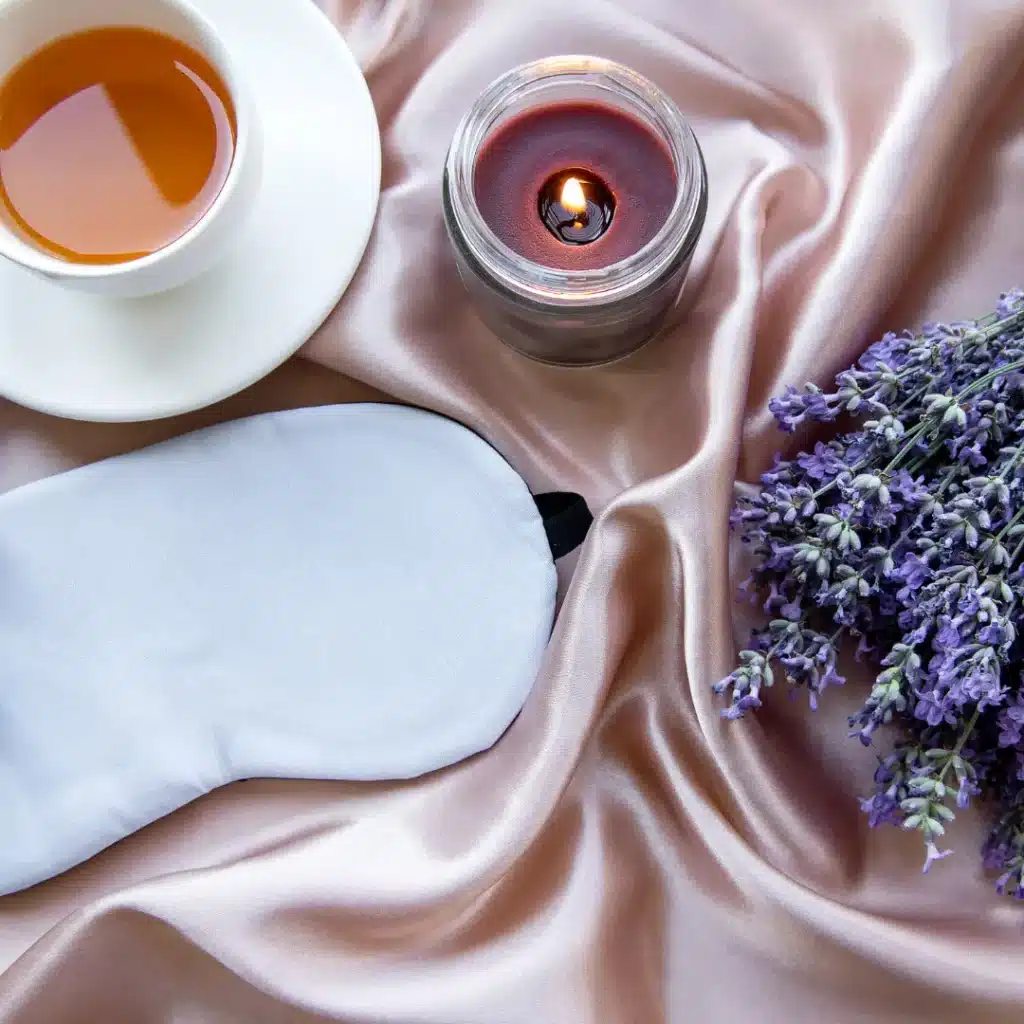
Are you someone who finds yourself tossing and turning in bed, desperately trying to fall asleep? You’re not alone! In today’s world where our to-do lists seem never ending, anxiety and stress can impede on a good night’s sleep. Luckily, Mother Nature has given us natural resources to help us fall and stay asleep in the form of sleep inducing teas. Rich in micronutrients like potassium and magnesium, these herbal teas boost feelings of sleepiness and relaxation, essentially aiding you to naturally fall asleep. In this article we will discuss how these herbal teas work, and which ones we recommend.
How Sleep Teas Work
In a good quality sleep tea has natural compounds that promote rest and relaxation. These natural minerals work with our body to naturally fall and stay asleep. Minerals like potassium and magnesium have a calming effect on the nervous system. Magnesium helps regulate neurotransmitters and melatonin, which is critical for a healthy sleep-wake cycle. Potassium works alongside magnesium to aid in maintaining a healthy nervous system. It also reduces muscle tension.
Anxiety and stress are the two most common disruptors of sleep. Sleep teas often have certain herbs known for their anxiety reducing properties. They can help calm your mind and nerves, making it easier to let go of the stress and anxiety of the day. Sipping a warm cup of tea in itself can have major calming effects. The ritual of having a hot cup of tea before bed can act as a sign to your body that it’s time to wind down and get ready for sleep. For teas like lavender and chamomile, the aroma has strong relaxation effects.
Choosing The Right Tea
Going to the tea aisle at the grocery store can be overwhelming with all of the options that are available to you. There are different types of teas with different uses, some teas help you fall asleep and some teas help you stay awake. It’s imperative to know what you’re looking for when picking the perfect sleep tea for you.
It is crucial to choose teas that are caffeine-free. Any caffeinated tea will have the opposite effects you’re looking for. Caffeine is a natural stimulant that helps you stay awake and alert, which is why coffee is commonly drunk in the morning. The last thing you want when you’re trying to fall asleep is the caffeine jitters. Traditional black and green teas have caffeine, while sleep teas are created from caffeine free herbs and botanicals.
Some teas are made with powders, rather than the herb in its whole, unprocessed form. To make sure you get the full calming and sleep inducing effects, go with teas that have the herb listed in its main ingredients, rather than the herb powder.
Timing Is Key
For the best results, it’s important to have a healthy and consistent sleep schedule. A healthy night routine is often overlooked as an essential part of a good night’s rest. When you have your sleep time tea can have a significant impact on how well it works for you. Just like a warm bath or reading a chapter of a book before you fall asleep, having a cup of tea at the exact same time every night will condition your body and your brain to see your tea ritual as a signal that it’s time to wind down and fall asleep. With time, this can become a powerful sleep cue.
Drinking your tea about an hour before bedtime allows the herbs and botanicals inside the tea to gradually take effect. Once it’s time to lay down, your body will already be in a state of relaxation, which makes it easier to fall asleep and stay asleep. It also will help you avoid the rush and chaos of the day. This time should be designated time for self care, providing you an opportunity to settle and focus on relaxation. Take this quiet hour for yourself, as it will allow you to shed the stress and demands of the day.
8 Sleep Inducing Teas
Lavender
Lavender is known for its beautiful purple petals and sweet, calming aroma. Not only is it a fragrant garden favorite, but it’s also one of the best sleep-inducing herbs. It has the ability to stimulate the GABA system in the brain. GABA is a neurotransmitter that reduces brain activity and promotes relaxation. Its active compounds linalool and linalyl acetate have been proven to induce calming effects. They interact with brain receptors to aid in reducing anxiety and stress. Even simply enjoying the rich aroma of lavender can have calming effects, creating an atmosphere of tranquility and increases your chance of getting a good night’s sleep.
Chamomile
Chamomile is often referred to as the “tranquilizer in a teacup”. It’s one of the most commonly used herbs in enhancing quality sleep. It has been used for centuries as a natural sleep remedy. There are a few different types of chamomile tea out on the market, and the difference lies in the source of the chamomile itself. To get maximum effects from chamomile, it’s important to drink tea that is made from chamomile buds rather than chamomile tea dust.
Chamomile contains a powerful flavonoid known as apigenin. Apigenin is a bioactive compound that’s found in chamomile, and it plays a key role in promoting relaxation and improving your sleep. It binds to GABA receptors and activates the brain’s GABAergic system, which inhibits brain activity and reduces anxiety. Chamomile encourages the brain to switch from a state of awake and alertness to tranquility and relaxation, which helps you naturally fall asleep.
Valerian
Often referred to as “nature’s sedative”, valerian is a powerful herb known to induce rest and relaxation. It is an ancient herb that’s been used for centuries for sleep aid, and is an extremely popular tea for those looking for a natural solution for insomnia. The Greeks and Romans recognized its calming effects and incorporated it into their healing practices. It has maintained its reputation for a reliable herbal remedy for sleep disorders.
Valerenic Acid, a compound found in valerian root, is known for enhancing the brain’s GABA levels, aiding to quiet the mind and reduce nervous tension. Isovaleric Acid, which is also found in valerian, is known for its muscle relaxing properties. The effects of valerian is often described as sedative, and has proven to be helpful with those dealing with anxiety or nervousness that prevents them from falling asleep.
It’s recommended to start with a low dose, and gradually increase until you find the perfect concentration that makes you feel sleepy, but still comfortable. Valerian is generally safe for most people, though there is about 10% of the population who may experience agitation or restlessness after drinking it. If instead of having calming effects, you’re experiencing restlessness, valerian may not be suitable for you.
Peppermint
Peppermint may not be the first herb that comes to mind when you think about sleep time teas. It’s known for its abrupt and refreshing smell and flavor, and is not typically associated with sleep. Surprisingly enough, there are a few reasons why peppermint can help you fall asleep.
Peppermint has a profound ability to soothe digestive discomfort. Things like indigestion or acid reflux can make it difficult to fall asleep. Drinking peppermint tea before bed can help with these digestive issues, keeping your digestive system at ease, allowing you to fall asleep comfortably. Peppermint also contains menthol, which is particularly valuable when it comes to falling asleep because it has muscle relaxing and soothing qualities. Menthol can open up your respiratory tract if you’re someone who experiences night time congestion or difficulty breathing.
Though peppermint might not be the best standalone sleep aid, paired with other remedies in your sleep routine can be extremely beneficial. Not only are their properties in peppermint that can help you fall asleep, the aroma alone can relax your brain. It’s important to note that peppermint may not be suitable for everyone as a sleep aid. Some people may experience increased alertness or restlessness. If this is you, it’s best to avoid it as part of your bedtime routine.
Passionflower
Passionflower has been used for centuries in traditional medicine to aid with anxiety, stress, and promote a sense of calmness. This makes it a highly sought after choice when choosing the perfect sleep time tea. It’s often referred to as a natural sedative due to its powerful ability to calm the nervous system. Like other herbs, it increases GABA levels in the brain.
Passionflower also is known for increasing serotonin production. Serotonin is responsible for mood regulation, and acts as a precursor for the creation of melatonin, which is the hormone that controls your sleep-wake cycle. The herb increases GABA levels in the brain, induce serotonin release, and alleviates anxiety and stress.
Lemon Balm
Lemon balm is often referred to as the “calming herb”, as it offers a refreshing twist on traditional sleep teas. It’s known for its vibrant lemony scent. The fragrance of lemon balm can have soothing and mood enhancing effects, and can also promote an atmosphere of serenity and calmness.
Lemon balms’ bioactive compounds, rosmarinic acid and polyphenols, aid in relaxing the mind. They interact with the neurotransmitters in the brain, reducing mental agitation and inducing cognitive relaxation. Though it’s not as potent as other sleep-inducing herbs, it provides a gentle sedative effect which is especially beneficial to those who experience restlessness.
Nettle
Nettle has a very long history of traditional medicinal use, offering a wide range of health benefits. It’s rich mineral content and soothing effects make it a top choice for promoting a great night’s sleep. It’s packed with essential minerals like potassium, calcium, silicon, magnesium, manganese, zinc, and chromium. These minerals work together to promote a healthy nervous system, reducing stress and anxiety. Nettle has been traditionally used to calm the nervous system and sooth the mind. The combination of minerals in nettle also alleviates muscle tension and cramps, which allows the body to relax better.
Magnolia Bark
Magnolia Bark is a natural remedy with a long history in traditional Chinese medicine. It has a profound ability to induce relaxation and support a good night’s rest. It’s an ancient herb whose qualities make it a notable choice for those seeking fast and complete sleep. The primary active compound in magnolia bark that aids in sleep is honokiol. It’s a bioactive molecule that has a significant impact on the brain’s GABA receptors, and aids in reducing brain activity. The key attribute of honokiol is its ability to bind these receptors, reducing the time it takes to fall asleep. Magnolia Bark is known for its rapid onset of sleep-inducing effects, so if you’re someone who struggles falling asleep quickly, this may be a helpful solution for you.
The Perfect Finishing Touch
From sleep supplements to silk bedding, cozy pajamas to sound machines, there are a variety of tools and practices that help us achieve the perfect night’s sleep. A warm, sleep tea can be the finishing touch you need to your sleep routine. The best part of sleep teas lies in their natural ingredients that work with our bodies to help us naturally fall asleep and stay asleep. Whether you’re looking for a scenty lemon-balm infused cup of tea, or a tranquil and relaxing cup of valerian, explore the world of sleep inducing teas to discover the perfect blend that’s right for you.



